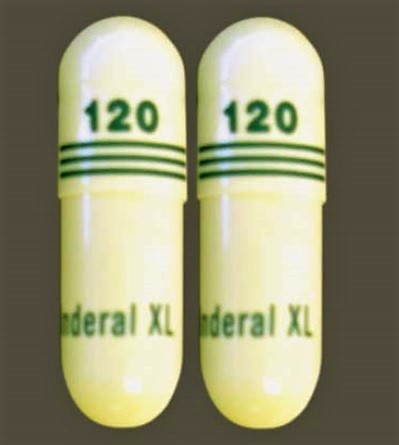Inderal XL Interactions
There are 593 drugs known to interact with Inderal XL (propranolol), along with 20 disease interactions, and 5 alcohol/food interactions. Of the total drug interactions, 47 are major, 496 are moderate, and 50 are minor.
- View all 593 medications that may interact with Inderal XL
- View Inderal XL alcohol/food interactions (5)
- View Inderal XL disease interactions (20)
Most frequently checked interactions
View interaction reports for Inderal XL (propranolol) and the medicines listed below.
- Adderall (amphetamine / dextroamphetamine)
- albuterol
- Ambien (zolpidem)
- amitriptyline
- cyclobenzaprine
- Cymbalta (duloxetine)
- Fioricet (acetaminophen / butalbital / caffeine)
- gabapentin
- ibuprofen
- Imitrex (sumatriptan)
- Klonopin (clonazepam)
- Lamictal (lamotrigine)
- Lipitor (atorvastatin)
- Lyrica (pregabalin)
- metformin
- Nurtec ODT (rimegepant)
- omeprazole
- Phenergan (promethazine)
- prednisone
- Pristiq (desvenlafaxine)
- Protonix (pantoprazole)
- rizatriptan
- Singulair (montelukast)
- Symbicort (budesonide / formoterol)
- tizanidine
- Topamax (topiramate)
- tramadol
- trazodone
- Vitamin D3 (cholecalciferol)
- Zofran (ondansetron)
Inderal XL alcohol/food interactions
There are 5 alcohol/food interactions with Inderal XL (propranolol).
Inderal XL disease interactions
There are 20 disease interactions with Inderal XL (propranolol) which include:
- bradyarrhythmia/AV block
- cardiogenic shock/hypotension
- CHF
- diabetes
- hypersensitivity
- ischemic heart disease
- PVD
- asthma/COPD
- liver disease
- cerebrovascular insufficiency
- glaucoma
- hyperlipidemia
- hyperthyroidism
- hyperthyroidism PKs
- myasthenia gravis
- pheochromocytoma
- psoriasis
- tachycardia
- Prinzmetal's variant angina
- renal impairment
More about Inderal XL (propranolol)
- Inderal XL consumer information
- Compare alternatives
- Pricing & coupons
- Drug images
- Side effects
- Dosage information
- During pregnancy or Breastfeeding
- En español
Related treatment guides
Drug Interaction Classification
| Highly clinically significant. Avoid combinations; the risk of the interaction outweighs the benefit. | |
| Moderately clinically significant. Usually avoid combinations; use it only under special circumstances. | |
| Minimally clinically significant. Minimize risk; assess risk and consider an alternative drug, take steps to circumvent the interaction risk and/or institute a monitoring plan. | |
| No interaction information available. |
See also:
Further information
Always consult your healthcare provider to ensure the information displayed on this page applies to your personal circumstances.


